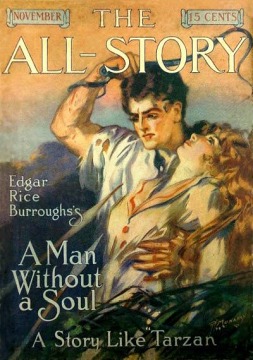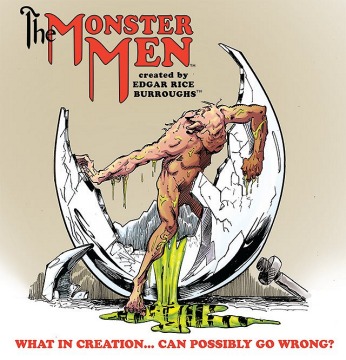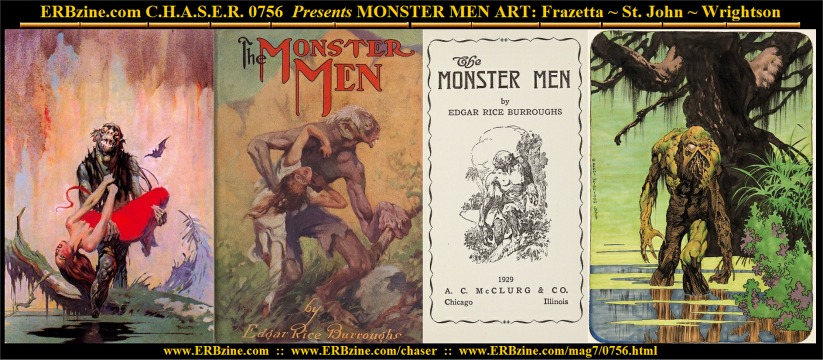
Official Edgar Rice Burroughs Tribute and Weekly Webzine Site
Volume 8086


By
Alan Hanson



The
course of events in Edgar Rice
Burroughs’ 1913 novel, The Monster Men
— various characters scurrying around a remote landscape, periodically
intersecting with each other — was a backdrop that Burroughs often used
in his
stories. However, over-shadowing the romance element in The
Monster Men is a far more interesting theme explored by ERB. A
basic
theme word —“soul” — appears early and often in the story. In fact, by
my
count, forms of that word (“soul,” “souls,” and “soulless) appear in
the novel
66 times. The title of Chapter 8 is The
Soul of Number 13.
I
believe that ERB occasionally revealed
his personal beliefs and values in his stories. I think he did so in The Monster Men when he addressed
the
mystical question, “What is a soul?” Along the way, he also probed
related
questions, including, “Who has a soul?” “How is a soul attained?” and
“How does
a soul reveal itself?”
All
of the major characters — Professor Arthur
Maxon, Virginia Maxon, Dr. Carl von Horn, and Bulan (aka “Jack” and
“Number 13”)
— addressed the topic in words and actions. The logical one to consult
first is
Professor Maxon, whose laboratory experiments created the baseline for
the
“soul” debate played out by the other characters. At first, the
professor was
unconcerned about the philosophical concept of a “soul.” Prior to the
story’s
opening, through a series of “daring experiments” in his New York
laboratory, the
professor had “reproduced by chemical means” the secret of life. His
initial
effort to create a replica of a human being in the lab left him
discouraged.
“He
saw the thing which he had created gasp once or twice with the feeble
spark of
life with which he had endowed it, and expire — leaving upon his hands
the
corpse of what was, to all intents and purpose, a human being, albeit a
most
grotesque and misshapen thing.”
Hoping
to forget the horrible nightmare,
the professor packed up his notes, daughter, and entourage, and moved
to a
remote group of Pacific Islands. There, though, he did not forget, but
rather was
reinvigorated. “The future of the world will be assured when once we
have
demonstrated the possibility of the chemical production of a perfect
race,” he
declared. After months of failed efforts, the obviously “mad professor”
regained his sanity, and abandoned the “insane obsession” which
“overpowered
his reason.”
During
all his work to create human-like
beings in his lab, there was no indication that Professor Maxon ever
considered
the idea that his creatures had “souls.” That only came to him when he
believed
his thirteenth creation had abducted his daughter. He told Von Horn,
his
assistant, “We shall need all our energies if we are to save my poor,
dear
girl, from the clutches of that horrid, soulless thing.”
While
Professor Maxon ultimately declared
that his creations were “soulless,” ERB didn’t have him comment on the
meaning
of having or not having a soul. For more specifics on that question, we
move on
to another character, Dr. Carl von Horn.
Early
and often, Von Horn made known his
intense hatred of the professor’s creations. Their lack of souls seemed
always
to be at the heart of his animosity. “They are things,” he told the
professor.
“They are not human — they are not even beast. They are terrible,
soulless
creatures. You have no right to permit them to live longer than to
substantiate
your theory.”
Von
Horn made sure the professor’s
creations understood that they were not human. “You are but the
accident of a
laboratory experiment,” he told Bulan, the professor’s final creation.
“You
have no soul, and the soul is all that raises man above the beasts …
you are
not a human being — you are not even a beast … (you’re) a horrible
monstrosity
far lower in the scale of creation than the lowest order of beasts.”
Through
continued degrading remarks and
physical abuse, Von Horn implanted fear, envy, jealousy, and hatred in
the
minds of the professor’s creatures. In doing so, ERB began revealing to
readers
something about the nature of a “soul.” Although possessing a human
“soul,” Von
Horn’s cruelty indicated that a human soul is not necessarily
compassionate by
nature.
His
efforts to woo Virginia Maxon further
put his evil nature on display. Burroughs later revealed that it was
the
possession of her father’s treasure chest that inspired Von Horn’s
desire for
Virginia. When she ultimately developed affection for Bulan, Von Horn
told her,
“No god created that. He was one of the creatures of your father’s mad
experiments — the soulless thing for whose arms his insane obsession
doomed
you.”
The
shooting of Bulan was among the last of
Dr. Carl von Horn’s evil deeds. He lost his head along with his soul,
presumably, at story’s end when the former relic is seen swaying from
the roof
a Borneo headhunter’s hut. If all humans have souls, ERB’s portrayal of
Von
Horn revealed how evil they could be in some people.
It
was Bulan, though, who was the central
figure in ERB’s analysis of “soul.” When he first appeared, Bulan had
no
memory. He believed it when the professor and Von Horn assured him that
he was only
the professor’s ultimate physically and mentally perfect chemical
creation of a
human male.
Von
Horn missed no opportunity to remind
Bulan that he was merely a byproduct of the professor’s evil work.
“You
are not as other men. You are but the accident of a laboratory
experiment. You
have no soul, and the soul is all that raises man above the beasts.
Jack, poor
boy, you are not a human being — you are not even a beast. The world,
and Miss
Maxon is of the world, will look upon you as a terrible creature to be
shunned —
a horrible monstrosity far lower in the scale of creation than the
lowest order
of brutes.”
Bulan’s
attraction to Virginia Maxon was
hampered by his depressed feeling of self-worth, even though he was the
only
one of the professor’s 13 creatures who “saw the beauties that
surrounded them
or felt the strange, mysterious influence of the untracked world they
trod.” Although
believing Von Horn’s assertions that he was not a man, Bulan aspired to
be one.
“If I am not now a human being,” he declared, “I intend to be one, and
so I
shall act as a human being should act.” And soon Bulan made a giant
leap
forward. Although still believing he was not born a human, he
nevertheless
declared. “I am not a soulless thing. I am a man, and within me is as
fine and
pure a soul as any man may own.”
ERB
then put Bulan’s self-proclaimed soul
to the test. After saving Virginia from native headhunters, he
considered a
future in which he and the girl would live alone together away from
mankind on
the remote island. The girl, however, dashed his hopes. “It would be
terrible,”
she cried. “I should die of misery and fright and loneliness in this
awful
jungle.”
Burroughs
then revealed that, although his
readers still believed (at least the naïve ones) that he had been
created in a
laboratory, Bulan was yet capable of self-sacrificing love for a human
woman.
“That
she would hate a soulless creature he accepted as a foregone
conclusion. He
desired her respect, and that fact helped him to his final decision,
but the
thing that decided him was born of the truly chivalrous nature he
possessed —
he wanted Virginia Maxon to be happy; it mattered not at what cost to
him.”
Through
the words and actions of Virginia, ERB
then began to reveal the answers to all the questions he had raised
about the
concept of a “soul” in the story. Early on, before she knew of her
father’s
experiments, Virginia spoke of Nature as the great creator in the
world. “What
a marvelous thing is creation,” she declared. “How insignificant is
man’s
greatest achievement beside the least of Nature’s works.” Thus, she was
horrified
when Von Horn told her what her father had done in his laboratory. “Do
you mean
to say that my father in a mad attempt to usurp the functions of God
created
that awful thing? And that there are others like it upon the island?”
Burroughs
then brought Bulan and Virginia
close together after he saved her from the headhunters who had captured
her. As
noted earlier, while Bulan had fallen in love with her, he wanted the
best for
her, which he realized would not include a future with him once she
learned of
how he was created by her father. Still he probed her beliefs on the
concept of
a “soul,” hoping there was a chance she would accept him. Their
conversation started
drawing the strands of the story together and began to resolve the
conflict
surrounding the concept of “soul” in The
Monster Men.
Bulan:
“Why
do you loathe them so? Is it because they are hideous, or because they
are
soulless?”
Virginia:
“Either fact were enough to make them repulsive, but it is
the fact
that they were without souls that made them totally impossible — one
easily
overlooks physical deformity, but the moral depravity that must be
inherent in
a creature without a soul must forever cut him off from intercourse
with human
beings?”
Bulan:
“And
you think that regardless of their physical appearance the fact that
they were
without souls would have been apparent?”
Virginia:
“I would know the moment I set my eyes upon a creature
without a soul.”
Bulan:
“Just
how do you distinguish the possessor of a soul? How then am I to know
what
attributes denote the possession of the immortal spark? How am I to
know
whether or no I possess a soul?”
Virginia:
“You are courageous and honorable and chivalrous — those
are enough to
warrant the belief that you have a soul, were it not apparent from your
countenance that you are of the higher type of mankind.“
Bulan:
“I
hope that you will never change your opinion of me, Virginia.”
Nevertheless,
Bulan, still believing he was
one of her father’s creations, declared his love for Virginia. Later,
after Virginia
learned his true origin for the first time, she responded:
“You
have given me the right to say it, Bulan, and I do say it now again,
before
them all — I love you, and that is all there is that makes any
difference … It
makes no difference to me what you are. You have told me that you love
me. You
have demonstrated a love that is high, and noble, and self-sacrificing.
More
than that no girl needs to know.”
At
that point, Burroughs had answered the basic
questions concerning the topic of “soul” in The
Monster Men. The author demonstrated that “soul” was the inner
force that
reveals itself through experience, imagination, and emotion. All
creatures of
higher intelligence have one, regardless of their sense of how they
were
created. It’s revealed through thoughts, desires, passions, and
interactions
with others.
In
the end, The Monster Men would have been a much more
powerful story had
Burroughs concluded the story at that point and sent Bulan and Virginia
back to
civilization to live out their lives always believing he was created in
a
laboratory. However, Burroughs’
one-and-done
stories usually came to definitive conclusions, and so ERB revealed
that Bulan
was actually a human who had lost his memory for a while. It was both a
happy
and a disappointing ending to an otherwise provocative story.

ALAN'S MANY
ERBzine APPEARANCES
www.erbzine.com/hanson
BILL HILLMAN
Visit our thousands of other sites at:
BILL and SUE-ON HILLMAN ECLECTIC STUDIO
ERB Text, ERB Images and Tarzan® John Carter® Priness of Mars® are ©Edgar Rice Burroughs, Inc.- All Rights Reserved.
All Original Work ©1996-2025 by Bill Hillman and/or Contributing Authors/Owners
No part of this web site may be reproduced without permission from the respective owners